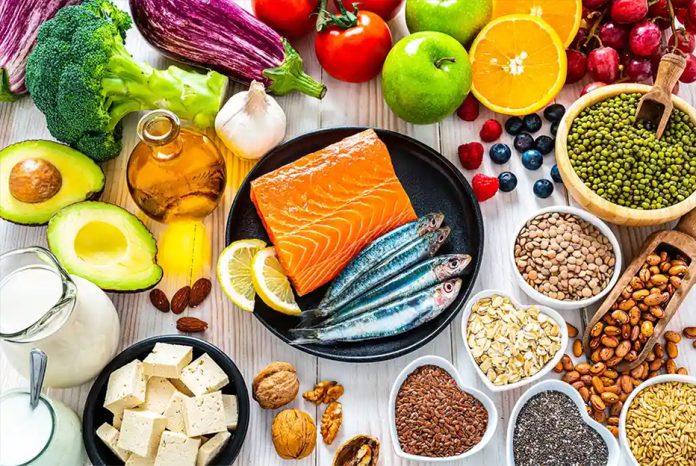Much emphasis is placed on how diet impacts our overall health. But what about our skin? Our skin is the largest organ of the body, and many skin conditions have both internal and external manifestations. Only a few studies have examined how diet can impact certain dermatologic conditions. I have compiled a list of common skin conditions and how diet can help or harm your skin.
Acne
Acne is a chronic condition that can appear on several parts of your body in what’s called the pilosebaceous unit. The size and activity of sebaceous glands or oil-producing glands have been identified as one of the causes of acne. Studies show that high glycemic index-containing diets can worsen acne, including the number of lesions and acne severity.
High glycemic index diets (think sugar, white bread, white rice) increase insulin levels. This stimulates oil production and adrenal androgen synthesis, which play a role in acne. While milk is considered a low-glycemic index food, it is unclear regarding the role milk plays in worsening acne.
Many self-reported studies show people experienced worsening acne with drinking milk. One U.S. study reported women who drank two or more glasses of skim milk per day were 44% more likely to experience acne. All forms of milk were shown to worsen acne. Adopting a low-glycemic index diet was shown to help improve acne severity and lesion count. According to one study, 87% of patients reported an improvement in acne after switching to a low glycemic index diet.
Dairy intake has also been shown to worsen acne. While the results are inconsistent, the general consensus is Western diets that are high in dairy are known to worsen acne.
Atopic Dermatitis
Atopic dermatitis is a chronic condition that is defined by its chronicity, relapsing symptoms, and strong family history. It appears as itchy, scaly patches that can worsen with seasonal changes and irritating clothing. There is a strong association between atopic dermatitis and food allergies.
It is reported that up to 30% of patients with atopic dermatitis also experience a food allergy. Many people try food-elimination diets to help improve their atopic dermatitis. Eliminating certain foods without proper guidance can lead to malnutrition or other serious health concerns. Before implementing an elimination diet, I recommend you be evaluated by an allergist for a formal diagnosis and to ensure your food restriction will be beneficial.
Maturing Skin
The basis of aging skin is the breakdown of collagen and elastin in your skin. There are recognized environmental causes (UV light, pollution), but dietary practices can also contribute. Eating sugar, fried, or grilled foods can induce advanced glycation end products (AGEs) that result in irreversible damage to collagen fibers.
Below is a list of foods that are known to reduce inflammation, free radical formation, and promote healthy blood sugar levels! Vitamin C is found in a lot of OTC products. Its claim to fame is reducing the free radical formation that develops with sun exposure.
In my opinion, foods rich in kojic acid (miso, soy sauce, rice water, sake) should be eaten in moderation given the potential adverse effects on thyroid function and growth. So best to keep it topical!
Body Odor
Body odor or bromhidrosis is a condition that can occur for numerous reasons, although diet has been shown to worsen symptoms. Eating foods like onions, curry, or garlic can contribute to body odor. Cruciferous vegetables, like cabbage and broccoli, and other foods like asparagus, curry, or fish can also cause temporary body odor. Alcohol can increase your body temperature, which adds to sweating.
Hidradenitis Suppurativa
This condition causes chronic, relapsing inflammation within the hair follicle. It is the recurring development of boils or pimples in the underarms, under breasts, groin, or buttocks.
People who have HS are more likely to have other conditions, like obesity and metabolic syndrome. Recent studies have shown a strong association with obesity and symptom severity of HS. For some, weight loss of at least 15% can significantly improve HS symptoms. Weight loss can be a tough feat for some people with HS because chronic inflammation has been shown to increase pro-inflammatory markers linked to weight gain.
Psoriasis
Psoriasis is a chronic condition characterized by increased inflammation causing thick white plaques on the skin. Like any other chronic inflammatory condition, it can be difficult to lose weight. Psoriasis increases the risk of obesity. Conversely, obesity promotes pro-inflammatory markers that may worsen psoriasis. Environmental causes, like diet, have been shown to affect psoriasis.
Low-energy diets, with a range of 800-1,000 calories a day, have been helpful in weight loss and reducing the severity of psoriasis.
Incorporating unsaturated fatty acids, like omega-3 and oleic acid, is a good idea because they are anti-inflammatory. It is best to avoid omega-6 fatty acids, as these are pro-inflammatory and can worsen psoriasis. Diets high in foods like salmon, seafood, and vegetable oils are a great source of omega-3.
Additionally, low glycemic index food helps to support the healthy effects of omega-3 ingestion.
Psoriasis is associated with several other conditions, including celiac disease. There is a threefold increased risk of developing both conditions. It is reported gluten-free diets help reduce psoriasis severity in patients with the celiac antibody. Diagnosis can be made with the help of a medical professional.
Many of the above options are part of a well-balanced healthy diet. Remember, there is always an adjustment period for any lifestyle change to take effect. Give yourself 3 to 6 months of consistency to see if this is right for you. Remember, you are what you eat!
Source: webmd.com









